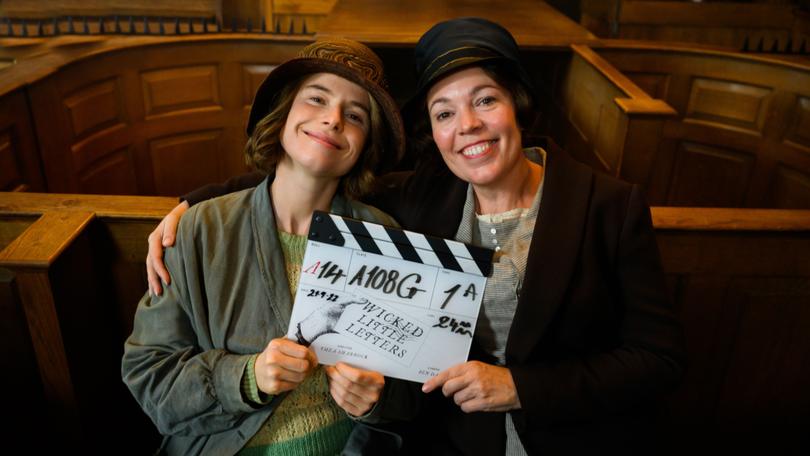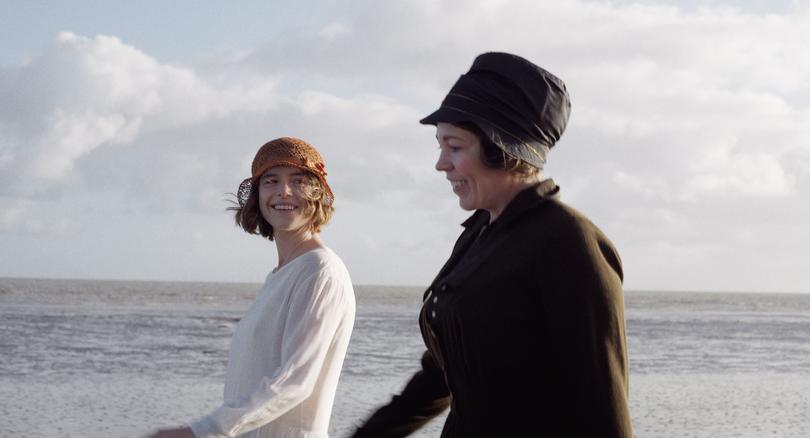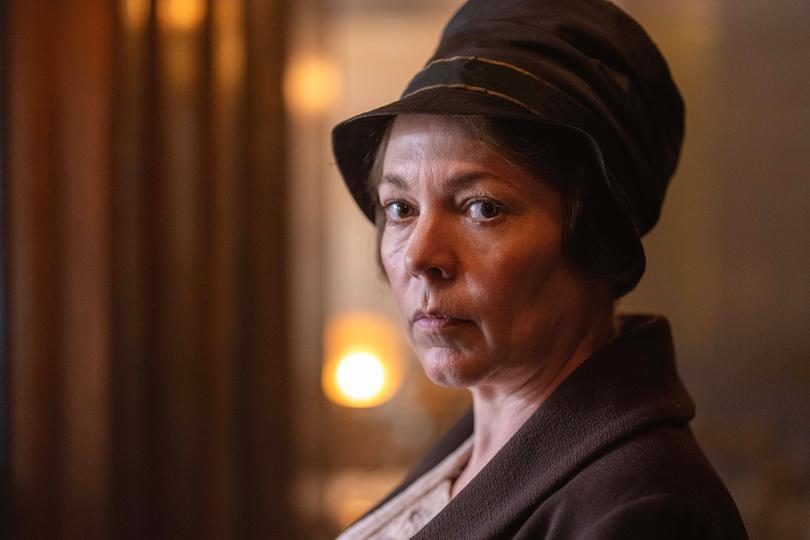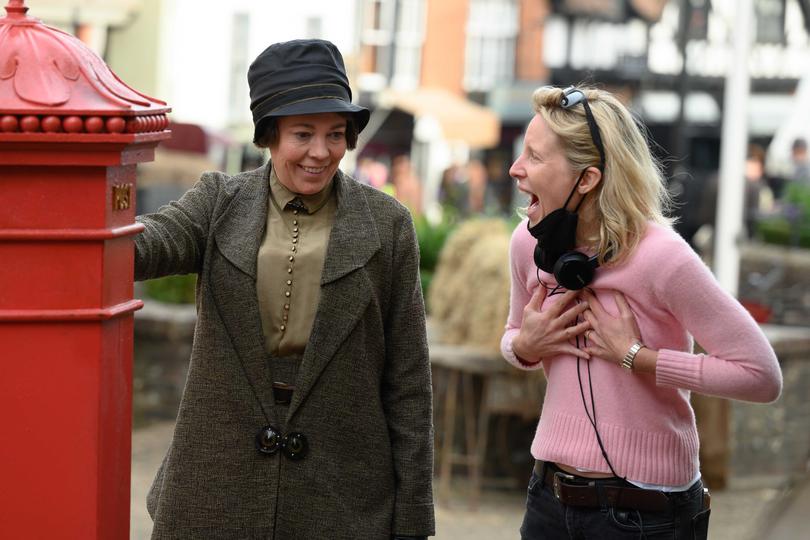Wicked Little Letters: Olivia Colman on swearing, oppressed women and social media trolls
If anyone was going to lead a movie about women and salty language, it was always going to be Olivia Colman.

Olivia Colman loves a swear word. Her favourite is the c-bomb.
“It still has power, it has oomph,” she tells The Nightly in Sydney. “I don’t think I’ve ever used it in anger but if it’s used in anger, it really has power. I love that it’s multifaceted.
“And you can still weed out who you’re going to get on with and who you’re not going to get on with.”
Sign up to The Nightly's newsletters.
Get the first look at the digital newspaper, curated daily stories and breaking headlines delivered to your inbox.
By continuing you agree to our Terms and Privacy Policy.The Oscar winner has spent the past three weeks in production in Adelaide — her first time in Australia — and during her time here, in between cuddling koalas (she assures us the creature she cradled on her hip did not seem to be itchy with chlamydia), feeding an emu and meeting a portoroo (“a sort of very pretty rat but it has a pouch and it’s tiny), she’s learnt that Australians and Brits are equal when it comes to salty words.
“I think it’s their love language, almost,” Colman says, beaming with her trademark warmth and that mischievous spark which suggests she’s about to break into a giggle. “But I do know quite a lot of Americans who love a swear but they don’t do it publicly.”

Wicked Little Letters is her latest film, based on a true 1920s case in the English town of Littlehampton in which a series of anonymous poison-pen letters had scandalised the community. The letters contained obscenities such as “You foxy arse old whore” or Colman’s favourite, “F**king in the noseholes”.
The primary recipient was a woman named Edith Swan (Colman), who never married and lived with her parents. Edith went to Christian women’s groups, did as her overbearing and misogynistic father decreed and gave an air of piousness.
The suspected sender was Rose Gooding (Jessie Buckley), her Irish neighbour who cursed like a sailor, drank like one too and generally didn’t believe in following the social decorum expected of her – including not wearing shoes on the sabbath, as Edith’s father pointed out with venomous contempt.
Edith and Rose were seeming opposites, and they were cast as such. The Madonna and the whore. “Obviously the only two types of women you get,” Colman says, cheekily.
“Edith was trying to fit into this box as well,” she explains. “No agency, no autonomy, no power at all as a girl. She clearly did well at school. Had she come from a more wealthy family, she could have carried on with her education but she wasn’t allowed to. She was in her late 40s under the thumb of her father – repressed, oppressed.
“It was the same for most women of that period, unless you have money. I love the fact it had to come out. It’s like wearing Spanx, you try and squeeze it, it will come out somewhere.

“And Rose, she was looked at with such disdain but we watch the film now and we go, ‘That’s how I want to be’. This is the woman who’s proud of herself and loud and she’s not ashamed to say what she wants to say.”
Wicked Little Letters takes place against the backdrop of the women’s suffrage movement in England, when conservative forces were pearl-clutching at the prospect of women having a voice outside of the kitchen.
It’s not explicitly part of the storyline but its spirit is obvious – and there is a smattering of references to it and the fact women who stepped into workplace during World War I were sent home when the men came back from the front.
“They cut out women’s pockets during suffrage,” Colman said, excited to be imparting a largely forgotten fact. “Pockets are a feminist issue. All outfits should have a pocket, because where the hell do you put your s**t?. She gestures to her pants, fitted with pockets.
“Women were handing out ‘votes for women’ material from their pockets and that’s when they said ‘Seal up women’s pockets’. Amazing.”
Wicked Little Letters’ century-ago story isn’t just still relevant on feminist grounds. The idea of vile letters being sent anonymously through snail mail might seem, at first, like strange, anachronistic behaviour, but the modern day equivalent – online trolling – is far more pervasive than the Littlehampton letters.
To Colman, the parallels became more apparent as they were making the film.
“It’s shocking that it’s been happening for 100 years and we have learnt nothing,” she laments. “If anything, it’s we’ve become much worst about it. I do believe in the ‘if you can’t say anything nice, don’t say anything at all’. If only that was more widespread.

“The lack of bravery, to be anonymous, and send something cruel to hurt another human being – and it does hurt, it is awful – it shouldn’t be allowed. It’s despicable, isn’t it? What pathetic power you must feel from hurting someone.”
Colman says she hopes that audiences will see Wicked Little Letters and recognise that’s not a nice thing to do but she’s realistic that one film is not going to stop an endemic act.
Colman has been working regularly in TV and film for two decades and despite being a mainstay on British telly in the likes of Peep Show and Green Wing, it was really in the past decade that she really broke out on an international level.
The acclaimed crime drama Broadchurch, in which she played a determined detective, Ellie, and roles in Yorgos Lanthimos’ mercurial The Lobster and John le Carre spy thriller The Night Manager, propelled her onto the global stage, which was supercharged when she won the Oscar for her performance as the selfish, entitled and vulnerable Queen Anne in The Favourite.
She is known for her range, for her ability to convey pathos and depth as well as impeccable comedic timing. She can play wily as she did in Marvel series Secret Invasion, she can do warm as she does in the British LGBTQI teen series Heartstopper. She’s fantastic at prickly characters you want to hate but can’t because Colman imbues a different layer to them, she did with Fleabag’s Godmother, the queen of passive-aggression, and the absurd and grotesque Mrs Scrubit in Wonka.

As Elizabeth II in the third and fourth seasons of The Crown, her performance of the late monarch made compelling a period during which very little seemed to have happened to the Queen. Even someone as at a distance as the Queen could be humanised as a mother or as a jealous leader.
Colman works a lot, and she works hard. She is prolific across screens small and large. “I do get that ‘Oh god, I’m never going to work again’, but I had nine months off last year, which was heaven.
“I try never to work in school holidays, I try never to be away from home, but I like working. I like being at work and I like being at home. I don’t necessarily like everything else around it.”
That “everything else” may well include promotions and press, including social media where all those online trolls are. Colman isn’t on any social media although people do impersonate her on it.
“I don’t do social media because I know wouldn’t be able to cope with it,” she admits. “And I’d like to pass on the message to powerful younger people, ‘Don’t do it, take yourself off it, there’s a lot more freedom in that’.
“I’ve taken myself out of that arena, I don’t want to know.
“Some love it and if they can cope with that, as long as no one is cruel, great! But I’ve also heard that younger actors are told they have to do it because you get cast on your follower numbers or something. That’s outrageous. Cast people because they’re right for the job. It’s unfair to force that on anyone.”
Colman has three children with her husband, Ed Sinclair, and said she hoped her teens could choose to not participate in social media.
“They’ll still have their wonderful friends and have much more freedom in their lives and be allowed to make mistakes away from prying eyes. It’s horrible, now everything is video-ed.”
She adds with an exasperated smile, “Urgh, f**k off, stop it”.

